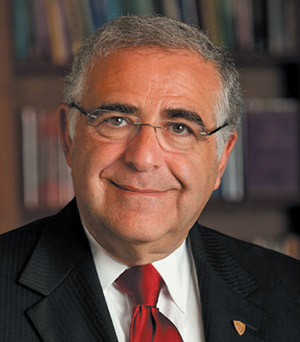
New York—Richard Joel, Yeshiva University’s president, may not have the confidence of the faculty, but the man who has held the job since 2003 has the strong backing of the school’s board of trustees.
The board responded after 80 percent of YU’s Yeshiva College faculty gave the president a vote of “no confidence” last Friday. YU has been hit with losses reported to be at least $600 million, including $100 million in lost investments in the Bernard Madoff Ponzi scheme.
Three percent of the faculty voted confidence in Joel with 17 abstentions. Roughly two thirds of the school’s faculty cast votes.
Faculty members point to this being the time of year when the 2015-16 academic year is already planned in terms of courses and faculty to teach those classes. The concern is that there won’t be funds available to employ sufficient faculty.
Dr. Henry Kressel, YU’s board chair, and the board still issued statements of support following Friday’s developments. “The Board is confident that President Joel and his administration will continue to work diligently to strengthen the bonds of collaboration and maintain the focus of the needs of our students, as well as the needs of the University as a whole. This is the best way to ensure that YU will flourish,” stated the open letter.
The Yeshiva University administration did not respond to questions by the Jewish Link asked via email. A source close to the issue, however, did tell the Jewish Link that it is much too “fragile a situation” for any staff or faculty member to make comment.” He, therefore, declined to be interviewed.
Gillian Steinberg, an associate professor of English and Director of YU’s Writing Course, did, however, speak to the Jewish Link.
“The morale here is extremely low right now,” she said. “Many faculty members are trying to get out of their positions. Students are coming to us in higher numbers than ever before. They are feeling the uncertainty now. But for the faculty, at this time of year, we usually would have a schedule for the fall.
“We’re also concerned about the long-term viability of the institution,” Dr. Steinberg, a member of the Yeshiva College Executive Committee, said. “It’s hard to understand how the leader who brought us into this situation is the leader who will take us out of the situation.”
Kressel’s letter, however, took on the no-confidence vote.
“This is an unfortunate development, given the Administration’s work and many meetings with faculty to develop plans to enhance the quality of the educational experience at YU while saving costs,” Kressel wrote. “While it’s regrettable that a small number of contract faculty will leave the University, we are building an organization and an academic program that creates more flexibility and options for students. Details will be shared soon on ways more of our students can enjoy and benefit from our outstanding scholars and how smaller programs can be strengthened.”
In its statement, the Board of Trustees took ultimate responsibility for Yeshiva University’s move forward, stating “This responsibility includes implementing a financial plan to ensure the sustainability of the institution.”
The vote, itself, doesn’t lead to a dismissal for Joel. If anything, it represents the fear of faculty members concerning lost teacher jobs and the closing of some academic departments.
An open letter from the Yeshiva University College Faculty stated that the school was spending approximately $50 million more than it was receiving annually.
YU’s Board, in its letter, called the proposed investment by the Montefiore Health System in a joint venture concerning the Albert Einstein College of Medicine an important gain.
But the faculty letter doesn’t see it that way. “There were no systems in place for financial reporting, and the administration essentially flew blind when it came to finances leading the university to the brink of catastrophe. Only when the university’s finances came under intense scrutiny did the administration finally admit to the reality it had created,” continued the letter.
Also the faculty members doubted that YU will be able to continue offering the “education that [a] Yeshiva College diploma ought to represent.” Joel has been quoted in the Israeli media as saying “Higher education is a business under stress in the United States. Across the board in the United States, it has become clear that the business model of higher education is not sustainable.”
YU is working with the corporate restructuring firm Alvarez & Marsal Holdings to work on what Joel reportedly called “a road map for sustainable excellence.”
Even with a downgrading of YU’s bond rating by Moody’s Credit Focus, its leader is supported.
“Under our direction, President Richard Joel, his administration and the Board’s outside advisors, Alvarez & Marsal (A&M) have identified areas across the entire university to streamline and realign operations, while ensuring the student experience remains vibrant. They have performed admirably in a difficult environment.”
Joel, 64, is Yeshiva University’s fourth president. Prior to coming to YU, he was from 1989-2003 the president of Hillel: The Foundation of Jewish Campus Life.
But for teachers, it’s been years of salary cuts and freezes. “And now we learn that even after the salary cuts and salary freezes, all of that isn’t even close enough. Now we find out we’re overspending by millions, said Dr. Steinberg. “But we continue to put faith in the person who got us here.
“YU is too important to the Jewish community to fail,” said Dr. Steinberg. “We’ve dedicated our lives to make it succeed. We don’t want to see it fail.”











